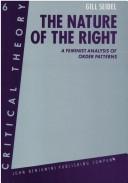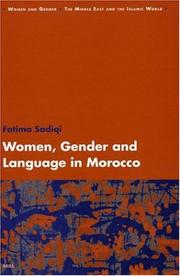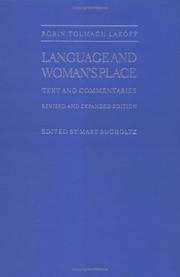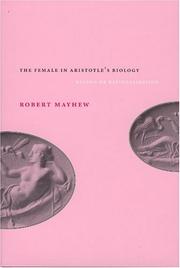| Listing 1 - 10 of 17 | << page >> |
Sort by
|

ISBN: 1283358867 9786613358868 9027278725 9789027278722 1556190360 1556190441 9789027224118 9027224110 Year: 1988 Publisher: Amsterdam Philadelphia J. Benjamins Pub. Co.
Abstract | Keywords | Export | Availability | Bookmark
 Loading...
Loading...Choose an application
- Reference Manager
- EndNote
- RefWorks (Direct export to RefWorks)
This volume challenges and extends the definition of right and right-wing discourse as traditionally conceived in male scholarship. The eleven papers share a common perspective: a critique of the ideology of 'natural difference' as the basis for oppression of the dominated group. In a radical feminist analysis, the relation of domination between the sexes is seen as central to the projects of the right, in which the constructions of 'nations', 'races' and 'gender' present variations in time and space. In its linking of oppressions, this books makes an important and timely contribution to femin
Discourse analysis --- Sexism in language --- Feminism --- Right and left (Political science) --- Sexist language --- Language and sex --- Language and languages --- Nonsexist language --- Sex differences --- Congresses --- Sexism in language - Congresses.
Book
ISBN: 3839444349 9783839444344 9783837644340 Year: 2018 Publisher: Bielefeld transcript Verlag
Abstract | Keywords | Export | Availability | Bookmark
 Loading...
Loading...Choose an application
- Reference Manager
- EndNote
- RefWorks (Direct export to RefWorks)
What exactly is rape? And how is it embedded in society? Hilkje Charlotte Hänel offers a philosophical exploration of the often misrepresented concept of rape in everyday life, systematically mapping out and elucidating this atrocious phenomenon. Hänel proposes a theory of rape as a social practice facilitated by ubiquitous sexist ideologies. Arguing for a normative cluster model for the concept of rape, this timely intervention improves our understanding of lived experiences of sexual violence and social relations within sexist ideologies.
Rape --- Assault, Criminal (Rape) --- Assault, Sexual --- Criminal assault (Rape) --- Nonconsensual sexual intercourse --- Sexual assault --- Offenses against the person --- Sex crimes --- Rape; Feminist Philosophy; Social Structures; Sexist Ideology; Sexual Violence; Violence; Gender; Social Philosophy; Gender Studies; Analytical Philosophy; Philosophy --- Analytical Philosophy. --- Feminist Philosophy. --- Gender Studies. --- Gender. --- Philosophy. --- Sexist Ideology. --- Sexual Violence. --- Social Philosophy. --- Social Structures. --- Violence.

ISBN: 9004128530 9789004128538 1423755448 9781423755449 1280914718 9786610914715 9047404378 Year: 2003 Publisher: Leiden Boston
Abstract | Keywords | Export | Availability | Bookmark
 Loading...
Loading...Choose an application
- Reference Manager
- EndNote
- RefWorks (Direct export to RefWorks)
This volume deals with the complex but poorly understood relationship between women, gender, and language in Morocco, a Muslim, multilingual, multicultural, and developing country. The hypothesis on which the book is based is that an understanding of gender perception and women's agency can be achieved only by taking into account the structure of power in a specific culture and that language is an important component of this power. In Moroccan culture, history, geography, Islam, orality, multilingualism, social organization, economic status, and political system constitute the superstructures of power within which factors such as social differences, contextual differences, and identity differences interact in the daily linguistic performances of gender. Moroccan women are far from constituting a homogeneous group, consequently the choices available to them vary in nature and empowering capacity, thus 'widening' the spectrum of gender beyond cultural limits.
Arabic language --- Berber languages --- Language and culture --- Sexism in language --- Women --- Sex differences --- Sex differences. --- Morocco. --- Language. --- Sexist language --- Language and sex --- Language and languages --- Nonsexist language --- Culture and language --- Culture --- Libyan languages --- Afroasiatic languages --- Semitic languages

ISBN: 9786612268984 1282268988 0299171337 9780299171339 0299171302 9780299171308 0299171345 9780299171346 6612268980 9781282268982 Year: 2001 Publisher: Madison, Wis. University of Wisconsin Press
Abstract | Keywords | Export | Availability | Bookmark
 Loading...
Loading...Choose an application
- Reference Manager
- EndNote
- RefWorks (Direct export to RefWorks)
English language
---
Masculinity
---
Sexism in language
---
Men
---
Sexist language
---
Language and sex
---
Language and languages
---
Nonsexist language
---
Human males
---
Human beings
---
Males
---
Effeminacy
---
Germanic languages
---
Sex differences
---
Language
---
Psychological aspects.
---
#BIBC:ruil
Book
ISBN: 9780521807111 9780521001748 9780511755033 0511429339 9780511429330 9780511429712 0511429711 0521001749 0521807115 1107194938 1281791245 9786611791247 0511428146 0511427530 0511755031 0511428855 9781107194939 9781281791245 6611791248 9780511428142 9780511427534 9780511428852 Year: 2008 Publisher: Cambridge Cambridge University Press
Abstract | Keywords | Export | Availability | Bookmark
 Loading...
Loading...Choose an application
- Reference Manager
- EndNote
- RefWorks (Direct export to RefWorks)
The issue of sexist language has been hotly debated within feminist circles since the 1960s. Previous books have tended to regard sexism in language as easy to identify and have suggested solutions to overcome and counter sexism. Sara Mills takes a fresh and more critical look at sexism in language, and argues that even in feminist circles it has become a problematic concept. Drawing on conversational and textual data collected over the last ten years, and with reference to recent research carried out in a range of different academic disciplines, Mills suggests that there are two forms of sexism - overt and indirect. Overt sexism is clear and unambiguous, while indirect sexism is based on pragmatics and the meaning and interpretation of utterances. Indirect sexism is extremely common and we therefore need new ways to challenge and analyse its usage in language.
Sociology of the family. Sociology of sexuality --- Sociolinguistics --- Sexism in language. --- Language and languages --- Language and sex --- Sexism in language --- Sexist language --- Nonsexist language --- Sex differences. --- Sex differences --- Arts and Humanities --- Language & Linguistics
Book
ISBN: 0585064954 9780585064956 143841580X Year: 1987 Publisher: Albany, N.Y. : State University of New York Press,
Abstract | Keywords | Export | Availability | Bookmark
 Loading...
Loading...Choose an application
- Reference Manager
- EndNote
- RefWorks (Direct export to RefWorks)
Women --- Sexism in language. --- Feminism --- Language planning --- Sociolinguistics --- English language --- Language and languages --- Planned language change --- Sexist language --- Language and sex --- Nonsexist language --- Human females --- Wimmin --- Woman --- Womon --- Womyn --- Females --- Human beings --- Femininity --- Language. --- Sex differences. --- Social aspects --- Planning --- Sex differences --- Germanic languages --- Language and culture --- Linguistics --- Sociology --- Integrational linguistics (Oxford school)
Book
ISBN: 311048210X 3110272911 9786613626813 1280596988 Year: 2012 Publisher: Berlin : De Gruyter,
Abstract | Keywords | Export | Availability | Bookmark
 Loading...
Loading...Choose an application
- Reference Manager
- EndNote
- RefWorks (Direct export to RefWorks)
In diesem Sammelband zur Genderlinguistik werden Praktiken der sprachlichen Konstruktion von Geschlechteridentitäten aus diversen Blickwinkeln aufgezeigt. Die Beiträge, die unterschiedliche methodische und theoretische Zugänge zur Untersuchung des Zusammenhangs von Sprache und Geschlecht präsentieren, diskutieren aktuelle Fragestellungen und skizzieren neue Perspektiven zur sprachlichen Konstruktion von Geschlecht. So werden Genderinszenierungen in medialen Zusammenhängen wie auch in Face-to-Face Interaktionen aufgezeigt, Aspekte des Zusammenspiels von Sprachsystem und Sprachgebrauch diskutiert und Fragen nach aktuellen Tendenzen einer "geschlechtergerechten Sprache" aufgeworfen.
Language and sex. --- Sexism in language. --- Nonsexist language. --- Inclusive language --- Nonsexist writing --- Bias-free language --- Sexism in language --- Sexist language --- Language and sex --- Language and languages --- Nonsexist language --- Sex and language --- Sex --- Sex differences --- Nonsexist usage --- Pragmatics (linguistics). --- deconstruction. --- gender studies. --- gender. --- linguistic sociology.

ISBN: 0195167570 0195167589 9786612366987 9786610535453 1280535458 128236698X 019534717X 0199883300 9780195347173 0197721869 Year: 2023 Publisher: New York ; Oxford University Press,
Abstract | Keywords | Export | Availability | Bookmark
 Loading...
Loading...Choose an application
- Reference Manager
- EndNote
- RefWorks (Direct export to RefWorks)
Widely recognized as having inaugurated feminist research on the relationship between gender and language, this revised edition includes an introduction and annotations by the author in which she reflects on some of the most widely discussed issues it raises.
English language --- Sex role. --- Sexism in language. --- Women --- Sex differences. --- Language. --- Sexist language --- Language and sex --- Language and languages --- Nonsexist language --- Gender role --- Sex (Psychology) --- Sex differences (Psychology) --- Social role --- Gender expression --- Sexism --- Social aspects --- Sex differences --- Germanic languages --- Gender roles --- Gendered role --- Gendered roles --- Role, Gender --- Role, Gendered --- Role, Sex --- Roles, Gender --- Roles, Gendered --- Roles, Sex --- Sex roles

ISBN: 1282932845 9786612932847 0226512029 9780226512020 9781282932845 6612932848 0226512002 9780226512006 Year: 2004 Publisher: Chicago : University of Chicago Press,
Abstract | Keywords | Export | Availability | Bookmark
 Loading...
Loading...Choose an application
- Reference Manager
- EndNote
- RefWorks (Direct export to RefWorks)
While Aristotle's writings on biology are considered to be among his best, the comments he makes about females in these works are widely regarded as the nadir of his philosophical oeuvre. Among many claims, Aristotle is said to have declared that females contribute nothing substantial to generation; that they have fewer teeth than males; that they are less spirited than males; and that woman are analogous to eunuchs. In The Female in Aristotle's Biology, Robert Mayhew aims not to defend Aristotle's ideas about females but to defend Aristotle against the common charge that his writings on female species were motivated by ideological bias. Mayhew points out that the tools of modern science and scientific experimentation were not available to the Greeks during Aristotle's time and that, consequently, Aristotle had relied not only on empirical observations when writing about living organisms but also on a fair amount of speculation. Further, he argues that Aristotle's remarks about females in his biological writings did not tend to promote the inferior status of ancient Greek women. Written with passion and precision, The Female in Aristotle's Biology will be of enormous value to students of philosophy, the history of science, and classical literature.
Misogyny. --- Women. --- Aristotle. --- feminine, woman, women, aristotle, philosophy, philosopher, ancient, well known, influential, biological, rational, oeuvre, lifes work, claims, arguments, generation, reproduction, physical, physiology, spirit, personality, behavior, eunuch, defense, species, ideology, bias, sexism, sexist, modern, contemporary, science, scientific, greek, greece, empirical, observation, data, speculation, entomology, embryology. --- Biology --- Female. --- Philosophy. --- history.
Book
ISBN: 0585054045 9780585054049 1438403216 9781438403212 Year: 1983 Publisher: Albany State University of New York Press
Abstract | Keywords | Export | Availability | Bookmark
 Loading...
Loading...Choose an application
- Reference Manager
- EndNote
- RefWorks (Direct export to RefWorks)
From the Back Cover: In a highly readable and lively text, the authors explore the way language mirrors our cultural assumptions, especially those concerned with gender distinctions. Focusing on contemporary issues, they draw on their knowledge of sociolinguistics and other languages to illustrate how sexism may be hidden by habits of language. In making the reader aware of these, they suggest options for change. Language And The Sexes synthesizes a wide range of up-to-date information and research under several topics: naming, stereotypes of language behavior, the politics of conversation, forms of address, asymmetry in vocabulary, and possibilities of reform. The book concludes with suggested projects related to these topics, guidelines for non-discriminatory language use, and an extensive bibliography.
English language --- Sexism in language. --- Women --- Men --- Sex role. --- Germanic languages --- Gender role --- Sex (Psychology) --- Sex differences (Psychology) --- Social role --- Gender expression --- Sexism --- Human males --- Human beings --- Males --- Effeminacy --- Masculinity --- Human females --- Wimmin --- Woman --- Womon --- Womyn --- Females --- Femininity --- Sexist language --- Language and sex --- Language and languages --- Nonsexist language --- Sex differences. --- Language. --- Sex differences --- Gender roles --- Gendered role --- Gendered roles --- Role, Gender --- Role, Gendered --- Role, Sex --- Roles, Gender --- Roles, Gendered --- Roles, Sex --- Sex roles
| Listing 1 - 10 of 17 | << page >> |
Sort by
|

 Search
Search Feedback
Feedback About UniCat
About UniCat  Help
Help News
News